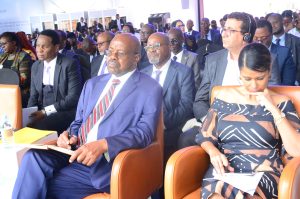By: Ismael Kasooha
KAMPALA
President Yoweri Kaguta Museveni has asked African leaders to dismantle the continent’s bottlenecks to socio-economic transformation for sustainable development.
“You cannot talk about sustainable development without socio-economic transformation,” said the President.
Museveni made the remarks during the opening of the 8th African Leadership Forum that took place at Speke Resort and conference center Munyonyo in Kampala. He cited Uganda’s approach to sustainable development and stressed the importance of enhancing local value addition, expanding regional markets and improving infrastructure.

Minister of State for Planning Hon. Amos Lugoloobi (front left) attending the Leaders Forum
The 8th African Leadership Forum (ALF) was co-convened by the former President of Tanzania and ALF Patron, Jakaya Kikwete, and former Prime Minister of Ethiopia, Hailemariam Desalegn to mobilize action on pressing developmental challenges.
Held on the margins of the Eleventh African Regional Forum on Sustainable Forum (ARFSD-11), this year’s theme, “Realizing Sustainable Development Goals in Africa: Progress and Way Forward,” underscores the urgent need to accelerate progress towards the United Nations’ 2030 Agenda and the African Union’s Agenda 2063.
President Museveni used the example of Uganda’s coffee exports, noting that while raw coffee fetches around $2.5 per kilogram, processed coffee can earn up to $40. “Africa donates over $20 to the world for every kilogram,” he stated, warning that reliance on exporting raw materials deprives the continent of wealth and job creation.
Museveni warned against the export of minerals such as iron ore, recalling a proposal to sell it to India for a mere $47 per tonne.
“Why export raw iron ore? Let it stay in the ground until we’re ready to add value here,” he emphasized.

(Front right) Ms. Rose Alenga, Senior Private Secretary to the Rt. Hon. Prime Minister and Dr. ALbert Byamugisha, Senior Technical Advisor on SDGs (back right) attending the Leaders Forum
On regional markets, the President noted that Uganda produces 5.3 billion litres of milk annually, but Ugandans only consume 200 million litres with the rest being surplus.
“We need bigger markets and improved infrastructure and affordable transport systems such as rail and water that the region has plenty of,” he said.
Highlighting the importance of Human Capital, Museveni pointed out that a country cannot transform if its population remains uneducated, unhealthy, and unskilled.
He cited initiatives such as Entandikwa and Operation Wealth Creation as key to moving Ugandans from subsistence to commercial production.
Former Tanzanian President Jakaya Kikwete reaffirmed the Forum’s role in fostering regional cooperation and sustainable growth through committed leadership, urging leaders to focus on proactive solutions for the continent’s development challenges.
“Africa is organized and can develop itself if the people themselves realise this. We have plenty of human capital and endowed with natural resources that can turn around this continent not foreign support,” Kikwete said.
Antonio Pedro, Deputy Executive Secretary of the Economic Commission for Africa, articulated the continent’s challenges and the path forward toward sustainable and inclusive growth.
Pedro highlighted the pressing issue of youth unemployment in Africa, where an estimated 10 to 12 million young people enter the workforce each year, yet only about 3 million formal jobs are created.
This alarming trend, he said, leaves over 76 million young Africans neither employed nor in education or training, reflecting a systemic failure that demands immediate attention.
“Unemployment is not just an economic issue; it threatens peace, social cohesion, and the legitimacy of our development model,” warned Pedro.
Pedro reiterated the need for structural transformation in Africa, moving away from reliance on raw commodity exports towards value addition and regional integration.
He lauded initiatives such as the transboundary Special Economic Zone for electric vehicle batteries between the Democratic Republic of the Congo and Zambia, which exemplifies Africa’s capacity to leverage its mineral wealth for regional industrialization.
END






